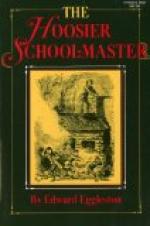[Footnote 27: Juberous is in none of the vocabularies that I have seen. I once treated this word in print as an undoubted corruption of dubious, and when used subjectively it apparently feels the influence of dubious, as where one says: “I feel mighty juberous about it.” But it is much oftener applied as in the text to the object of fear, as “The bridge looks kind o’ juberous.” Halliwell gives the verb juberd and defines it as “to jeopard or endanger.” It is clearly a dialect form of jeopard, and I make no doubt that juberous is a dialect variation of jeopardous, occasionally used as a form of dubious.]
CHAPTER XXIX.
THE TRIAL.
The “prosecuting attorney” (for so the State’s attorney is called in Indiana) had been sent for the night before. Ralph refused all legal help. It was not wise to reject counsel, but all his blood was up, and he declared that he would not be cleared by legal quibbles. If his innocence were not made evident to everybody, he would rather not be acquitted on a preliminary examination. He would go over to the circuit court and have the matter sifted to the bottom. But he would have been pleased had his uncle offered his counsel, though he would have declined it. He would have felt better to have had a letter from home somewhat different from the one he received from his Aunt Matilda by the hand of the prosecuting attorney. It was not very encouraging or very sympathetic, though it was very characteristic.
“Dear Ralph:
“This is what I have always been afraid of. I warned you faithfully the last time I saw you. My skirts are clear of your blood, I can not consent for your uncle to appear as your counsel or to go your bail. You know how much it would injure him in the county, and he has no right to suffer for your evil acts. O my dear nephew! for the sake of your poor, dead mother—”
We never shall know what the rest of that letter was. Whenever Aunt Matilda got to Ralph’s poor, dead mother in her conversation Ralph ran out of the house. And now that his poor, dead mother was again made to do service in his aunt’s pious rhetoric, he landed the letter on the hot coals before him, and watched it vanish into smoke with a grim satisfaction.
Ralph was a little afraid of a mob. But Clifty was better than Flat Creek, and Squire Hawkins, with all his faults, loved justice, and had a profound respect for the majesty of the law, and a profound respect for his own majesty when sitting as a court representing the law. Whatever maneuvers he might resort to in business affairs in order to avoid a conflict with his lawless neighbors, he was courageous and inflexible on the bench. The Squire was the better part of him. With the co-operation of the constable, he had organized a posse of men who could be depended on to enforce the law against a mob.




